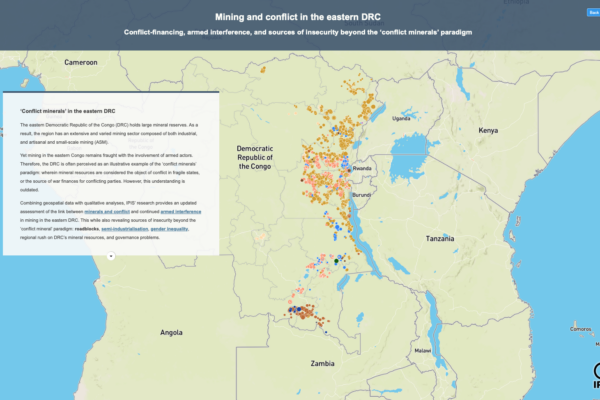
Exploitation minière et conflit dans l’est de la RDC: Une carte narrative interactive
11 mars 2024Financement des conflits, ingérence armée et sources d’insécurité au-delà du paradigme des « minerais de conflit » Dans cette carte narrative, IPIS présente les résultats de ses recherches sur le lien entre l’exploitation minière et le financement des conflits dans l’est de la République démocratique du Congo (RDC). Basée sur une enquête menée entre 2021-2023 dans 829 sites miniers actifs (représe
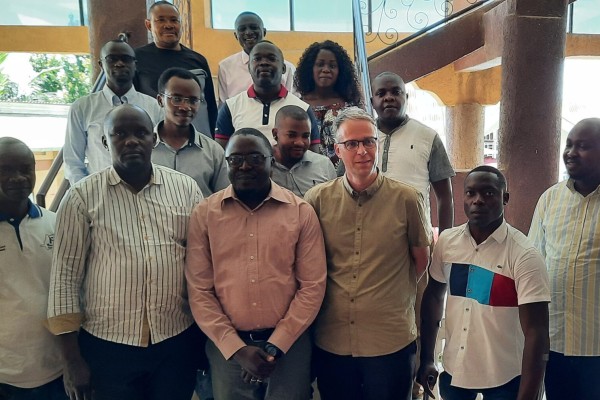
Kufatilia se transforme en réseau de la société civile, désormais doté d’une nouvelle plateforme de suivi des incidents miniers.
19 janvier 2024Première réunion annuelle du nouveau réseau Kufatilia En novembre 2023, les partenaires Kufatilia se sont rendus à Bunia et Bukavu, dans l’est de la République démocratique du Congo (RDC), pour assister à la première réunion annuelle du nouveau réseau Kufatilia. Composée de deux conférences distinctes en Ituri et au Sud-Kivu, la réunion a rassemblé vingt-deux organisations de la société civil
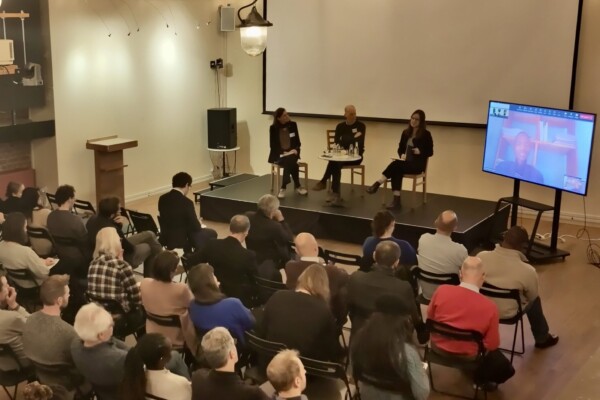
IPIS Event: Congolese cobalt, EU regulations, and direct investment
9 janvier 2024On the 30th of November, IPIS hosted its annual panel discussion, this time on current challenges facing the cobalt sector in the Democratic Republic of the Congo (DRC) and the potential impact of European Union (EU) regulations to improve these. Moderated by Lotte Hoex, the panel consisted of Esperant Mwishamali, independent researcher on cobalt artisanal and small-scale mining (ASM) in the DRC,
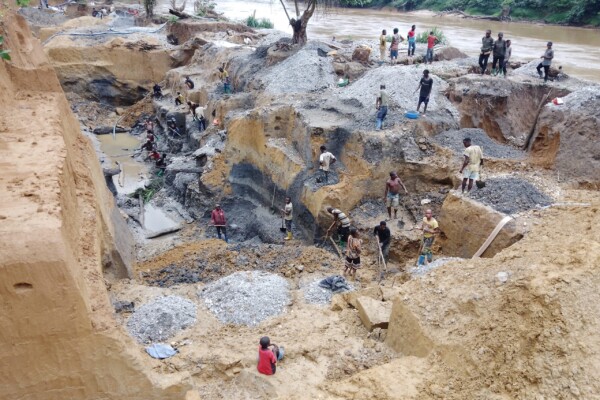
Analyse de la carte interactive des zones d’exploitation minière artisanale dans l’est de la République démocratique du Congo (Mise à jour 2023)
22 décembre 2023Depuis 2009, IPIS a cartographié et collecté des données sur plus de 2 800 sites d’exploitation minière artisanale et à petite échelle (EMAPE) dans l’est de la République démocratique du Congo (RDC). Dans ce rapport, IPIS fournit sa mise à jour 2023 de l’état de l’EMAPE dans l’est de la RDC, basée sur des données provenant de plus de 829 sites artisanaux et de petite échelle dans la zone entre 202

Increasing awareness of policy reforms on gender equality issues in artisanal and small-scale mining in eastern DRC: Case study of the Numbi, Nzibira and Nyabibwe sites
13 décembre 2023The mineral resources of the eastern Democratic Republic of the Congo’s (DRC) provide an important source of employment for both men and women involved in artisanal and small-scaling mining (ASM). Yet opportunities are not equal for men and women. Based on a series of interviews with various ASM stakeholders at the mines of Numbi, Nzibira and Nybibwe in the province of South Kivu, this
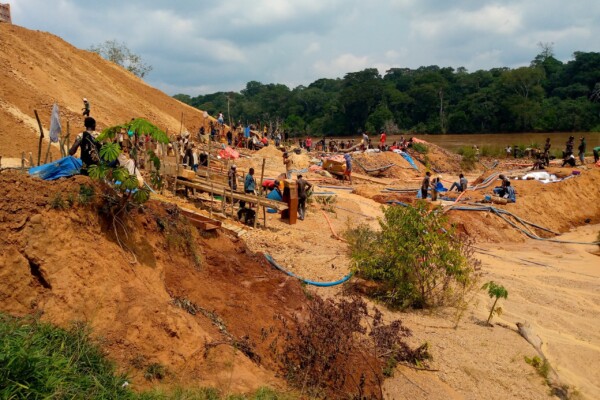
Cartographie des sites minieres artisanaux dans la région du Mambasa occidental, province de l’Ituri, République démocratique du Congo
22 novembre 2023La partie occidentale du territoire de Mambasa, dans la province de l’Ituri, fait l’objet d’une attention limitée de la part des autorités nationales et des partenaires internationaux. Pourtant, l’expansion des activités d’exploitation artisanale et à petite échelle de l’or (ASM) y est importante, y compris dans la Réserve de Faune à Okapis (RFO). Ces opérations minières ont provoqué des tensions
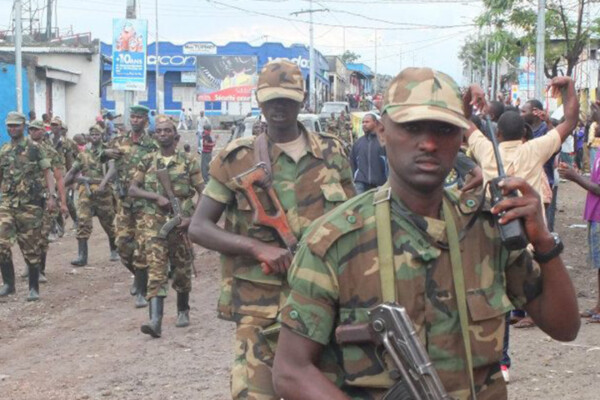
M23 crisis flares again in North Kivu: context, dynamics and risks
16 novembre 2023Past October, violence resurged in North Kivu province, as clashes intensified between the Movement of March 23 (M23) and various local militias, as well as the Congolese army (FARDC). An additional 200,000 people have been displaced last month, exacerbating the dire humanitarian situation in the province which already counted over 590,000 internally displaced persons (IDPs) due to the M23 crisis
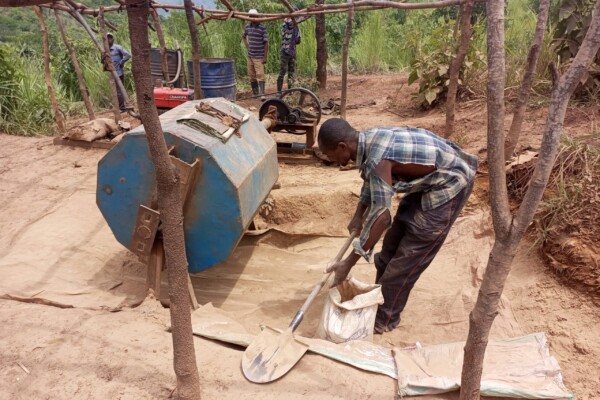
Sécuriser l’insécurité: Orpaillage semi-industriel et violence à Mwenga, Sud-Kivu en République Démocratique du Congo
6 octobre 2023Depuis 2011, l’introduction progressive de nouveaux équipements miniers tels que les concasseurs a conduit à une mécanisation croissante des opérations d’exploitation artisanale de l’or ainsi qu’à l’arrivée de sociétés minières semi-industrielles dans le territoire de Mwenga (Sud-Kivu). Ce rapport fait partie d’un projet financé par USAID visant à examiner les liens entre les conflits armés, l’ins
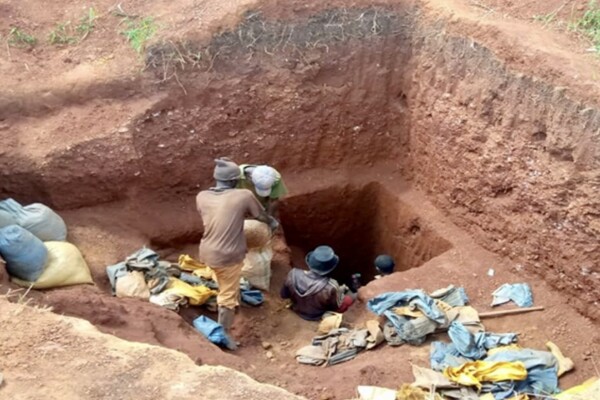
Voix du Congo: Le rôle de l’artisanat minier dans le processus de démobilisation et réinsertion des miliciens de la FRPI dans la chefferie de Walendu Bindi, Ituri
22 septembre 2023Une publication de la série: VOIX DU CONGO Située au nord-est de la République démocratique du Congo, la province de l’Ituri a connu près de deux décennies d’activisme du groupe armé Force de Résistance Patriotique de l’Ituri (FRPI). L’échec du programme de démobilisation, de désarmement et de réintégration (DDR) lancé en 2020 et resté inachevé a conduit les combattants de la FRPI à retourner de m
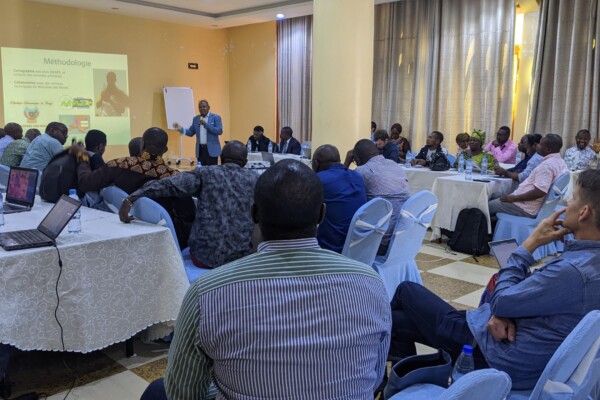
Sharing the results of two years of research into eastern DR Congo’s artisanal mining sector
12 juillet 2023Since 2021 and in partnership with USAID and the Congolese Ministry of Mines (through its technical service SAEMAPE), IPIS has been undertaking a large-scale project to map and analyse artisanal mining supply chains and conflict financing dynamics in eastern DRC. A restitution meeting was held in Goma (North Kivu) on June 21st, 2023 to present and discuss the results produced over the past two yea
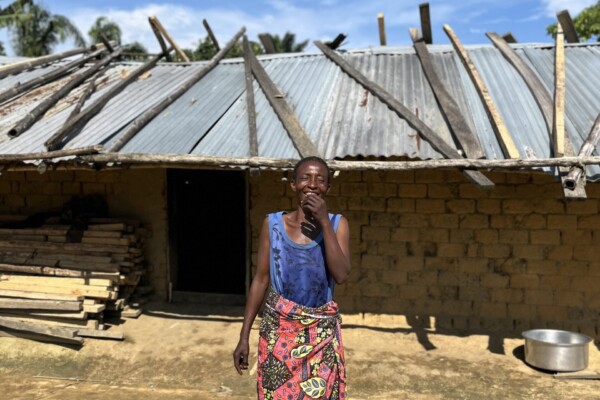
Unconditional Cash Transfers (UCT) in the DRC: Midline results of a pilot study in an artisanal mining zone in Maniema province
19 juin 2023In October 2021, the Belgian non-profit organization Eight World, started a pilot project of Unconditional Cash Transfers (UCT) in a village in an artisanal mining zone in the territory of Pangi, in Maniema Province, in the Democratic Republic of Congo (DRC). Eight World transfers cash directly to individual beneficiaries via a mobile money system. Each adult living in the UCT village receives 20
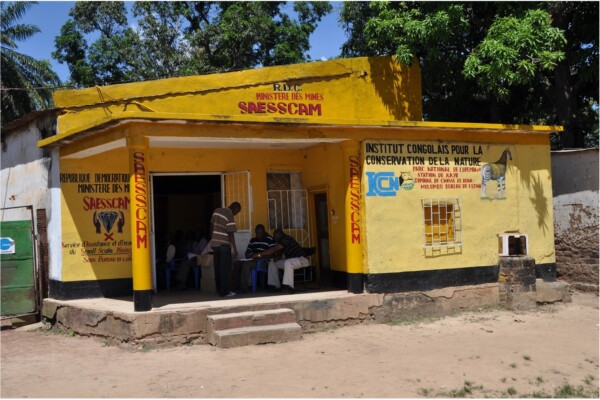
Taxes et prélèvements dans les sites miniers artisanaux du Sud Kivu et de l’Ituri : combien paie un mineur artisanal ?
14 avril 2023Ce rapport est le résultat d’une étude de terrain de grande ampleur sur la fiscalité du secteur minier artisanal dans deux provinces de l’est de la République démocratique du Congo, l’Ituri et le Sud-Kivu. La principale conclusion est que les réglementations et les pratiques actuelles dans ce domaine contribuent non seulement à la contrebande de minerais – laissant une partie du potentiel fiscal d
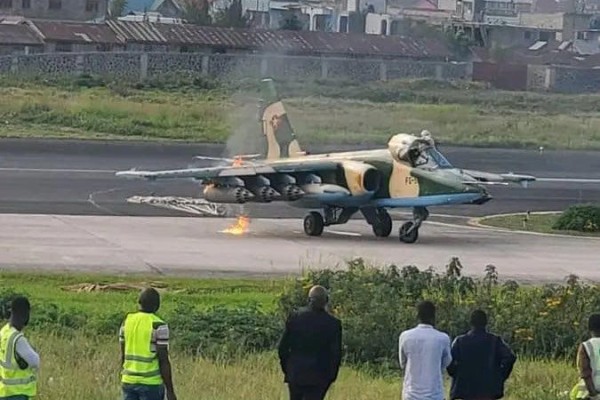
Pourquoi le M23 n’est pas un groupe rebelle comme les autres
6 février 2023IPIS Briefing – Janvier 2023 This briefing is also available in English. L’année dernière, des changements majeurs sont intervenus dans la partie orientale de la République Démocratique du Congo (RDC), ravagée par des groupes armés depuis des décennies. Un groupe en particulier est passé au premier plan, le Mouvement du 23 Mars (M23). Les objectifs du M23 se situent à l’intersection des inté
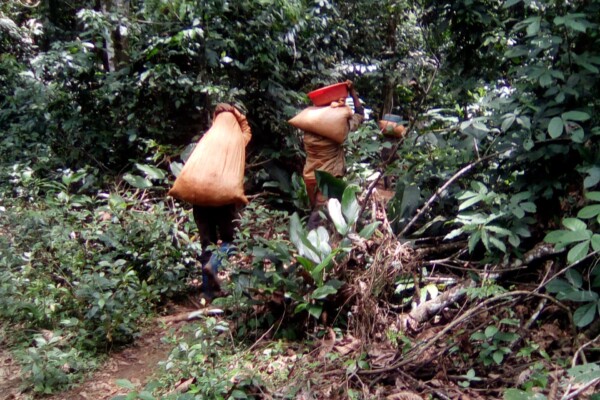
Armed conflict, insecurity, and mining in eastern DRC: reflections on the nexus between natural resources and armed conflict
7 décembre 2022This report offers a new framework for looking at the eastern Congo conflict, one within which new evolutions of the past twenty years find a place. Indeed, violent conflict in eastern Congo has changed dramatically in all its aspects over the past two decades. Yet too often policymakers and observers appear to assume that we are dealing with a proxy war orchestrated from the DRC’s eastern neighbo
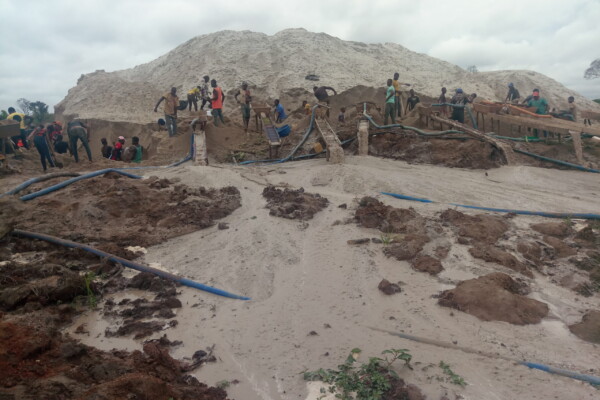
Analyse de la carte interactive des zones d’exploitation minière artisanale dans l’Est de la République démocratique du Congo (2022)
29 novembre 2022télécharger le Synthèse (FR) Dans l’est de la République démocratique du Congo (RDC), le secteur de l’exploitation minière artisanale et à petite échelle (EMAPE) joue un rôle important dans l’économie locale. Alors que les conflits armés à grande échelle autour des richesses minières de la RDC ont considérablement diminué au cours des vingt dernières années, les acteurs armés continuent d’interfér
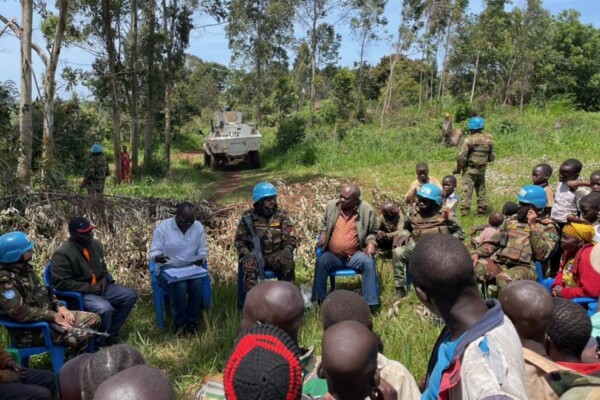
Is the UN overstaying its welcome in the Democratic Republic of Congo?
28 novembre 2022What is happening? Since July 2022 the Democratic Republic of Congo (DRC) has seen a series of protests against MONUSCO, the UN peacekeeping mission deployed in the DRC. The protests took place in multiple cities in eastern DRC, which has recently seen an increase in armed group activity. The protestors voiced their anger towards the UN for being unable to protect civilians against the violence of
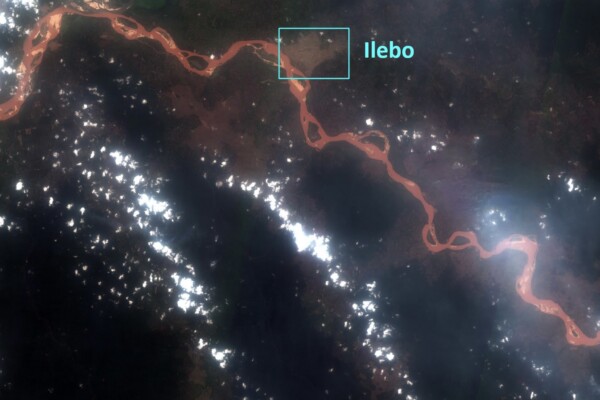
Eaux troubles au Kasaï. Pollution par l’industrie diamantaire angolaise et négligence coupable du gouvernement congolais
5 septembre 2022IPIS Briefing – Août 2022 Ce briefing est également disponible en anglais. Environ un an après que la nouvelle soit parvenue à la presse mondiale, on n’entend presque plus parler de la catastrophe environnementale causée par la mine de diamants angolaise Catoca. Pour rappel, fin juillet 2021, les médias locaux ont fait état pour la première fois de la décoloration rouge brunâtre de l’eau sur des c
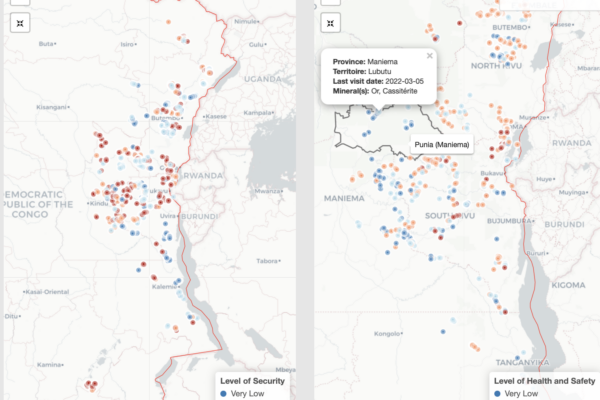
Responsible mining scorecard in eastern DRC
31 août 2022Over the years, IPIS has systematically collected mine site and trade hub level data on artisanal and small-scale mining (ASM) in eastern DRC. This data collection has enabled IPIS to generate a sizable database of more than 3,000 ASM sites that draws both on sites visited by IPIS and data from third party sources including the Congolese mining cadastre and the Mini
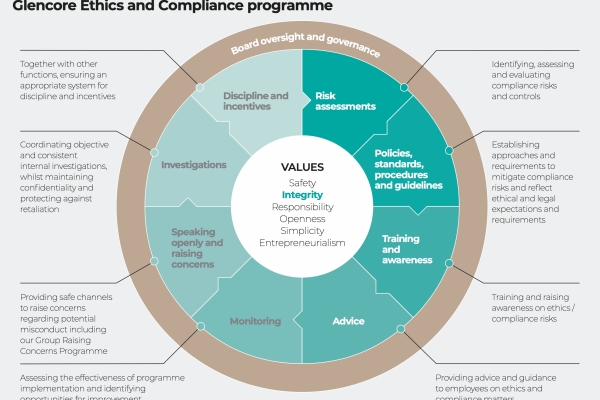
A fault confessed is half redressed: Glencore pleads guilty
27 juin 2022IPIS Briefing – June 2022 On the 24th May 2022, the Justice Department of the United States announced that Glencore pleaded guilty for foreign briberies and Market Manipulation Schemes in violation of the Foreign Corrupt Practices Act and had accepted a USD 1.1 billion settlement. The same day, Glencore Energy UK Limited also made public that it would plead guilty in the invest
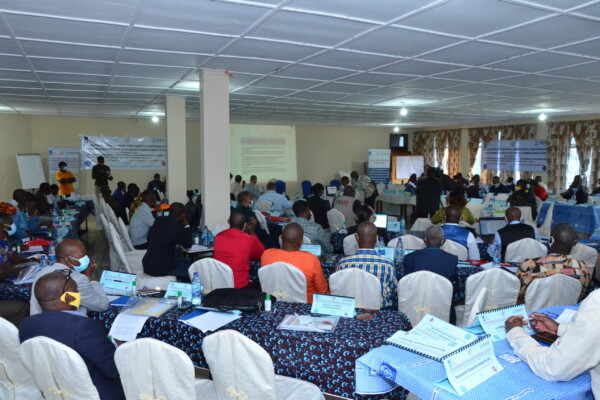
“La mine bleue”, un nouveau statut pour les sites miniers qualifiés en RDC. Le résultat d’un plaidoyer réussi par le Projet Madini
23 novembre 2021Le 12 novembre 2021, la Ministre Nationale des Mines de la République Démocratique du Congo (RDC), Madame Antoinette N’Samba Kalambayi, a signé l’arrêté ministériel instituant un nouveau statut pour la qualification/validation des sites miniers artisanaux : le Statut Bleu. La qualification et la validation des sites miniers (conformément au mécanisme de certification régional de la CIRGL) est un p

